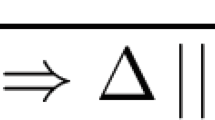Abstract
Satisfiability or Sat\(^{1}\) is the metatheoretic statement
Every formally intuitionistically consistent set of first-order sentences has a model.
The models in question are the Tarskian relational structures familiar from standard first-order model theory (Chang and Keisler in Model theory, 3rd edn, Dover Publications Inc., Mineola, 2012), but here treated within intuitionistic metamathematics. We prove that both IZF, intuitionistic Zermelo–Fraenkel set theory, and HAS, second-order Heyting arithmetic, prove Sat\(^{1}\) to be false outright. Following the lead of Carter (Notre Dame J Form Log 49(1):75–95, 2008), we then generalize this result to some provably intermediate first-order logics, including the Rose logic (Trans Am Math Soc 61:1–19, 1953). These metatheorems distinguish the intuitionistic foundational significance of Sat\(^{1}\) sharply from that of Sat\(^{0}\), the satisfiability claim for intuitionistic propositional logic. At the same time, they establish intuitionistic connections with and between Test, COMP\(^{0}\), and \(\mathbf{COMP }^{1}\). Here, Test is the scheme of Testability, and COMP\(^{0}\) and \(\mathbf{COMP }^{1}\) are completeness for intuitionistic propositional logic and predicate logic, respectively.
Similar content being viewed by others
References
Beeson, M. J., Foundations of Constructive Mathematics. Metamathematical Studies. Ergebnisse der Mathematik under ihrer Grenzgebiete, 3. Folge, Band 6, Springer, Berlin, 1985, p. XXIII+466.
Carter, N., Reflexive intermediate propositional logics, Notre Dame Journal of Formal Logic 47(1):39–62, 2006.
Carter, N., Reflexive intermediate predicate logics, Notre Dame Journal of Formal Logic 49(1):75–95, 2008.
Chang, C., and J. Keisler, Model Theory, 3rd edn., Dover Publications Inc., Mineola, 2012, p. XVI+650.
Friedman, H., Classically and intuitionistically provably recursive functions, in G. Mueller, and D. S. Scott, (eds.), Higher Set Theory, Springer, Berlin, 1978, pp. 21–27.
Jech, T., Set Theory, Academic Press, New York, 1978, p. xi+621.
Kreisel, G., and A. S. Troelstra, Formal systems for some branches of intuitionistic analysis, Annals of Mathematical Logic 1(3):229–387, 1970.
McCarty, C., Realizability Semantics for Intuitionistic Formal Systems, D. Phil. Dissertation. Trinity Term, Oxford, 1984, 281 pp.
McCarty, C., Realizability and recursive set theory, Journal of Pure and Applied Logic 32:153–183, 1986.
McCarty, C., Constructive validity is nonarithmetic, The Journal of Symbolic Logic 53(4):1036–1041, 1988.
McCarty, C., Intuitionistic completeness and classical logic, Notre Dame Journal of Formal Logic 43(4):243–248, 2002.
McCarty, C., Completeness and incompleteness for intuitionistic logic, The Journal of Symbolic Logic 73(4):1315–1327, 2008.
Rautenberg, W., Klassische und nichtklassische Aussagenlogik. Logik und Grundlagen der Mathematik, Band 22, Vieweg und Sohn, Braunschweig, 1979, 361 pp.
Rose, G., Propositional calculus and realizability, Transactions of the American Mathematical Society 61:1–19, 1953.
Scott, D., Personal email communication, 2016.
Troelstra, A. S., and D. van Dalen, Constructivism in mathematics: an introduction, vol. I, in Studies in Logic and the Foundations of Mathematics, vol. 121. North-Holland, Amsterdam, 1988, p. xx+342+XIV.
Author information
Authors and Affiliations
Corresponding author
Additional information
Publisher's Note
Springer Nature remains neutral with regard to jurisdictional claims in published maps and institutional affiliations.
Presented by Yde Venema; Received June 8, 2018.
Rights and permissions
About this article
Cite this article
McCarty, C. Satisfiability is False Intuitionistically: A Question from Dana Scott. Stud Logica 108, 803–813 (2020). https://doi.org/10.1007/s11225-019-09877-y
Published:
Issue Date:
DOI: https://doi.org/10.1007/s11225-019-09877-y



